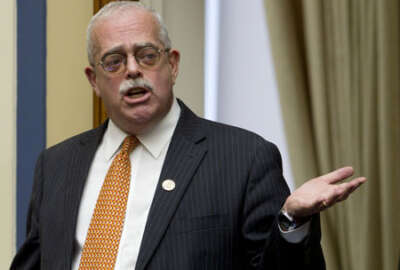
Homeland Security’s bug bounty pilot went so well, the agency is looking to expand upon it
In today's Federal Newscast, DHS is ready to expand its cyber bug bounty program after a successful pilot.
To listen to the Federal Newscast on your phone or mobile device, subscribe in PodcastOne or Apple Podcasts. The best listening experience on desktop can be found using Chrome, Firefox or Safari.
- The Government Accountability Office is pushing for Congress to change the Payment Integrity Information Act of 2019 as a response to the ongoing COVID pandemic. GAO said lawmakers should update the law to require all new agency programs making more than $100 million annually in payments as “susceptible to significant improper payments” for their initial years of operation. This change, GAO said, would address ongoing delays in agency reporting of improper payment information as seen with COVID-19 spending. It also would change the processes for reporting improper payments, which have impacted the transparency, timeliness, reliability and completeness of payment information. These delays also contributed to the federal government’s inability to identify the full extent to which improper payments occur and take appropriate actions to reduce them.
- A top Democrat on the House Oversight and Reform Committee is directing the State Department to recoup millions of dollars from an unfinished embassy project. National Security Subcommittee Chairman Stephen Lynch (D-Mass.) said agency records show the company Caddell Construction failed to obtain the necessary permits to build a new U.S. embassy in Turkmenistan. Lynch said construction was supposed to be completed in July 2018, but the project is still ongoing. The embassy facility was supposed to cost $196 million, but is now on track to cost $430 million.
- Boeing said it still plans to deliver a pair of highly-modified 747 airplanes to serve as the next generation of Air Force One, but it’ll lose a lot of money on the deal. CEO David Calhoun told investors yesterday a significant share of its more than $1 billion losses in the first quarter had to do with the Air Force One deal the company struck with former President Donald Trump in 2018. Calhoun said the agreement created risks “Boeing probably should not have taken,” and happened because the negotiations were widely publicized at the time. (Federal News Network)
- As supply chain issues continue to plague the United States, lawmakers are focusing on the military’s stockpiles. Two lawmakers are calling for more money to revive the Defense Department’s national stockpiles of rare earth minerals. The bipartisan duo said the stockpiles of minerals like titanium and cobalt are at critically low levels. China currently produces more than 60% of the world’s rare minerals. The legislators wrote a letter to the House Appropriations Committee asking for support in adding more than $250 million to increase the stockpiles. The United States established the national stockpile during World War II in order to ensure the military had the resources it needed in case of supply chain disruptions.
- The Army said it’s taking the next steps in its Unified Network plan. The service said it is now establishing milestones and setting governance for the Unified Network. The program will modernize the Army’s IT systems needed for joint operations in the future. The military is continuing to move toward more joint weapons and systems. The Defense Department’s Joint All Domain Command and Control will connect systems to share data and make decisions faster. (Federal News Network)
- President Joe Biden has tapped a new deputy for U.S. Cyber Command. Biden nominated Air Force Lt. Gen. Timothy Haugh for the number two position at CYBERCOM. If confirmed, he would replace Lt. Gen. Charles Moore. Haugh is currently the head of 16th Air Force, the service’s primary cyber command. He previously served as commander of the Cyber National Mission Force. And during a prior stint at CYBERCOM, Haugh oversaw Joint Task Force Ares, which led offensive cyber operations against the Islamic State of Iraq and Syria.
- DHS is ready to expand its cyber bug bounty program after a successful pilot. The Department of Homeland Security is planning eight new bug bounty programs next year and is seeking to set up a new contract to handle that effort. DHS released a request for information asking for industry feedback on its approach to this indefinite delivery, indefinite quantity contract. Under this acquisition, DHS wants the contractor to design the bug bounties, manage a vulnerability disclosure platform and hire and vet the cyber researchers. This new contract follows an initial pilot that DHS ran in 2021 that found more than 122 vulnerabilities, of which 27 were critical. DHS awarded a total of $125,000 to participants.
- Federal recruitment and cybersecurity are a few key components of the Department of Homeland Security’s fiscal 2023 budget request. Under the request, DHS will hire 300 agents and 300 processing coordinators for the Border Patrol. That’s part of the White House’s total request of $97.3 billion for DHS. The request also includes $1 billion to modernize facilities and invest in border security technology. Secretary Alejandro Mayorkas said at a hearing Wednesday that the request provides the necessary funding and authorities for DHS.
- The Postal Service is seeking to hire 2,800 front-line supervisors over the coming months. USPS is planning to hire these supervisors to work in customer services, distribution operations, maintenance operations and transportation operations. Current USPS career and non-career employees are eligible to apply for these positions. Postmaster General Louis DeJoy, in a recent interview, said USPS is looking to staff up with front-line supervisors under its 10-year plan to improve operational efficiency. The vacant positions are Executive Administrative Schedule Level 17 jobs. Employees at this level max out at more than $87,000 a year. (Federal News Network)
- The Equal Employment Opportunity Commission is looking to reduce wait times for its 1-800 assistance number for field calls. EEOC is also partnering with civil rights and workers’ organizations to reach individuals without access to virtual technology. Chairwoman Charlotte Burrows said at a hearing that the White House’s fiscal 2023 budget request does provide the resources needed to lower wait times. Currently, EEOC appointment calendars often stretch several months into the future. That comes as the agency is still in union negotiations for re-entering field offices.
- We now know some of the best public servants in the federal workforce. This year’s cohort of finalists in the Service To America Medals program are out. This year’s list includes 44 individuals and several teams. They’ve done outstanding, jury-reviewed work in pandemic response, human rights around the world, climate and the environment, national security and many other fields. The annual Sammies program is run by the Partnership for Public Service, with awards available only to career federal employees.
Copyright © 2025 Federal News Network. All rights reserved. This website is not intended for users located within the European Economic Area.
Eric White
Eric White is news anchor and Federal Drive producer at Federal News Network.
Follow @FEDERALNEWSCAST
Related Stories
AP/Carolyn Kaster




